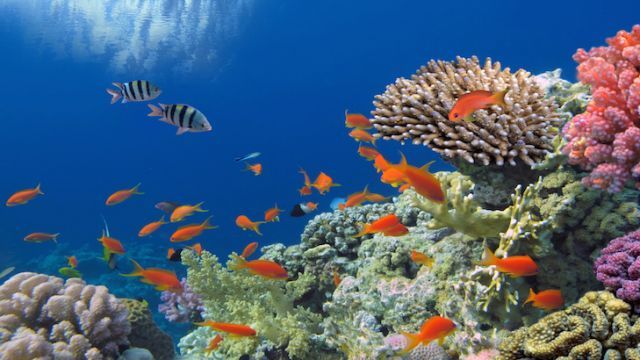
Coral reefs are the rainforests of the ocean, and much like the Amazon or the Congo, they are under great stress due to destructive human activity.
Despite taking up only 0.25 percent of the world’s oceans, coral reefs provide habitat for over 25 percent of the world’s marine life. It’s estimated that as many as 2 million species make their homes and/or reproduce in coral reefs and directly rely on their health for survival.
Coral reefs, like rainforests, provide a carbon sink that reduces the amount of CO2 in our atmosphere and slows climate change. Unfortunately, climate change threatens the survival of the coral reefs, and without them climate change would speed up drastically.
Coral reefs and the economy
Coral reefs also play an important role in our economy. The World Wildlife Fund estimates that every kilometer of coral reef is worth $137,000 to $1.2 million dollars through fishing, tourism and by providing shoreline protection. The international charity also estimates that fishing the coral reefs in Southeast Asia alone is a multi-billion dollar industry.
The estimated economic value of the world’s coral reefs is $375 billion, and they also provide food or other resources for 500 million people.
Health of the coral reefs
We have already lost 40 percent of the world’s coral reefs, and scientists predict that if drastic action is not taken we will lose the rest — along with all the benefits they provide for the planet — by 2050.
Some reefs aren’t expected to even make it that long, however, as Caribbean reefs are expected to be gone within the next 20 years, and researchers studying Florida’s coral reef expect them to die sooner than expected because of accelerated bleaching.
If international cooperation doesn’t yield a plan to save the coral reefs, habitat and breeding locations for the the ocean’s marine life is at risk.
Threats to the coral reefs
Human activities degrading and destructing the health of coral reefs are plentiful and include:
Climate change: Everything on our planet is impacted by climate change, but some are less able to adapt than others. Coral reefs are very sensitive to changing temperatures, and even slight changes can have drastic effects.
When the air or ocean warms it causes zooxanthellae (a type of algae) to leave the tissue of the corals, turning them white and making them less able to fight off disease. This process is referred to as coral bleaching, and climate change has increased the occurrence of such events drastically in the last 30 years.
Increased CO2 in our atmosphere is absorbed by the ocean’s water as well, increasing the water’s acidity and making it much more difficult for coral to grow. Researchers estimate that the oceans will become 1.5 times more acidic by the end of the century, potentially making it impossible for any coral to grow at all.
Coastal Development: When there is increased development on land nearby, it can degrade the health of coral reefs. The influx of people and buildings causes increased runoff of pollutants, which is harmful to the corals.
In addition to the airports, golf courses and hotels that are often built to increase tourism in coastal areas, coral reefs are also damaged through irresponsible tourism that involves snorkeling and tourists touching and interacting with the reefs or marine life.
Blast fishing: In what has to be one of the most blatant abuses of an ecosystem happening at the moment, coral reefs are disappearing in part because we keep blowing them up. This lazy approach to fishing involves throwing explosives into the water, and then the dead fish rise to the surface and are easily collected. Coral reefs are often completely destroyed this way off the coast of Tanzania, but even if they survive they will require decades or even centuries to fully recover.
Other threats to the reefs include overfishing, invasive species and the loss of marine life to the global aquarium trade.
What is being done?
The International Coral Reef Symposium met in Hawaii from June 20 to 24 this year in a global effort to discuss strategy for saving the reefs. Over 2,500 experts and policy makers representing nearly 100 countries took part.
By sharing information and resources, the potential for an emerging technology or method to save the reefs increases, and there are plenty of novel ideas being researched around the world.
One such novel idea is being led by a team of researchers in Australia, and involves experimenting with growing “super corals” that are more adaptable to changes in temperature. These genetically modified corals might be able to pick up where naturally occurring corals left off — before they died off. As with any genetically modified organism, there are concerns once you release it into the wild; there is no telling what might happen, but it would be hard for such damages to exceed the impact of what could occur if all coral reefs were destroyed.
Don’t count out nature
Our changing climate brings with it much uncertainty. There is nobody who can truthfully state they know exactly how the planet will respond to changes in the atmosphere; there are too many variables for anything or anyone to be certain. A case of that is the recent discovery of a large reef by the mouth of the Amazon River, in waters normally thought to be too muddy for reefs to grow. The reef is home to over 60 species of sponges and 70 species of fish.
As much as human efforts are needed to help reverse the damage done to the world’s reefs, we should not underestimate nature’s ability to adapt as well.
—Ian Carey

